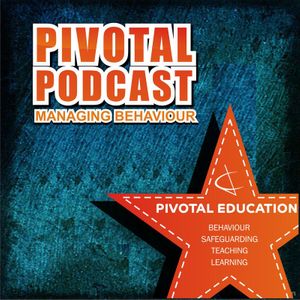Lisa Ashes on ‘doing education to them’ and naked teaching! PP144
Pivotal Podcast - Un pódcast de Pivotal Education

Categorías:
It was great to have Lisa Ashes as our last guest of 2016. Lisa is an Advanced Skills English teacher, a development trainer, a writer, Independent Thinker, charity worker and a Reflective Learning Geek! Lisa’s latest book is called ‘Manglish’ and she aims to encourage the practice of fusing cross-curricular subjects in a challenging way. The ideas came from a time when Lisa realised that every teacher in the school she was in was teaching numeracy and literacy in different ways, trying their hardest, but were focused primarily on the needs of the exams they were preparing the children for. The book follows everything Lisa did to persuade teachers to look at what they were already doing and ask, ‘Where’s the literacy in that?’ and ‘Where’s the numeracy in that?’ Originally a secondary project, Lisa has now been working with primary colleagues and in FE. Lisa points out that Manglish originated from listening to what teachers were already doing rather them hitting them with another new initiative. She looked at what was being done, found what was already good and then found ways of joining all the subjects together. Have we got inclusion dreadfully wrong and what should we be doing about it? Lisa believes there is the will to get inclusion right but schools often don’t have the time, the resources or the expertise to make it work in the mainstream. She has gone ‘under-cover’ as a supply teacher so she can go into lots of different schools and observe what’s going on. She has seen several schools who have created what they call ‘nurture groups’ or ‘stage not age’ groups while the teachers mainly focus on the groups they need to get through the exams so they don’t lose their jobs. This often leads, in Lisa’s experience, to children ‘just being baby-sat’. To look after these children properly takes time, money, training and expertise. Lisa has been excellent special schools who get it right but mainstream secondary schools are not always geared up to provide what is needed. Primary schools teaching assistants are often brilliant but simply don’t have the time to devote to these children. What do you mean by ‘doing education to children?’ This comes from Lisa’s own experience of school. She didn’t care about exams when she was at school – it wasn’t that she couldn’t do it, she just couldn’t see the purpose in exams It wasn’t until she needed to pass exams to become a teacher that she had a real purpose and succeeded in exams. She talks about the children in ‘nurture groups’ or those set up for children with behavioural difficulties and asks us to imagine what it’s like for them having education done to them until they are actually released into ‘real life’. She believes that we need to include them much more and help them to understand the purpose of education far beyond the exam. While Lisa was a classroom assistant before becoming a teacher, she was put in a cupboard – literally. So she studied the experiences of the children from their own perspective. She could see why and how the teacher was boring her students and this ‘CPD’ went on for a year. She was then a project co-ordinator, given a budget of £70,000 to help students receive exam passes – she approached the task as much as she could from the point of view of the students. What needs to be changed in order to free us up from the obsession with exams? Lisa thinks we are forgetting what she calls ‘the whole journey of the child’. She feels we focus far too much on the exam years, to the detriment of the rest. We need to focus on development, not just the end result of the exam. We also need to think about who is accountable and how we deal with failure. Lisa’s controversial view is that, in secondary school, teachers should take a cohort of children through from year 7 to 11. That’s what she wants in her role. Rather than this,